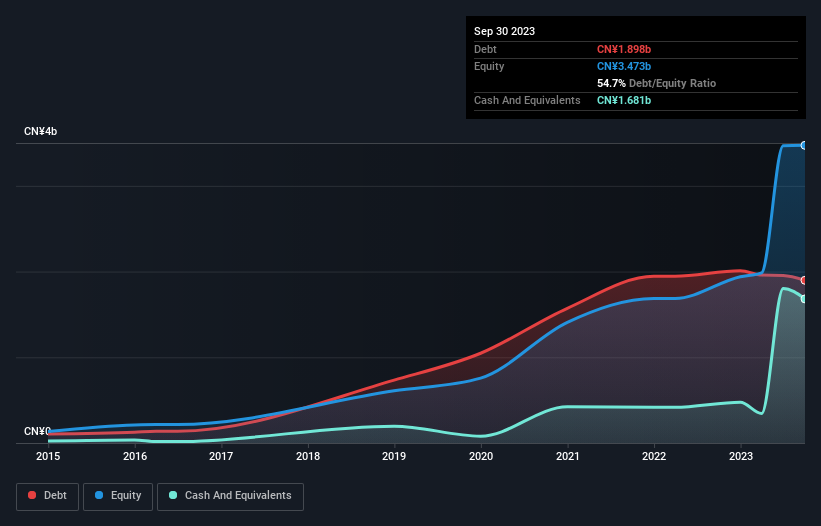- China
- /
- Commercial Services
- /
- SZSE:301305
Is Shenzhen Leo-King Environmental Group (SZSE:301305) A Risky Investment?

Howard Marks put it nicely when he said that, rather than worrying about share price volatility, 'The possibility of permanent loss is the risk I worry about... and every practical investor I know worries about.' So it seems the smart money knows that debt - which is usually involved in bankruptcies - is a very important factor, when you assess how risky a company is. We can see that Shenzhen Leo-King Environmental Group Company Limited (SZSE:301305) does use debt in its business. But the real question is whether this debt is making the company risky.
When Is Debt A Problem?
Generally speaking, debt only becomes a real problem when a company can't easily pay it off, either by raising capital or with its own cash flow. Ultimately, if the company can't fulfill its legal obligations to repay debt, shareholders could walk away with nothing. However, a more frequent (but still costly) occurrence is where a company must issue shares at bargain-basement prices, permanently diluting shareholders, just to shore up its balance sheet. Of course, plenty of companies use debt to fund growth, without any negative consequences. The first step when considering a company's debt levels is to consider its cash and debt together.
Check out our latest analysis for Shenzhen Leo-King Environmental Group
What Is Shenzhen Leo-King Environmental Group's Net Debt?
The image below, which you can click on for greater detail, shows that Shenzhen Leo-King Environmental Group had debt of CN¥1.90b at the end of September 2023, a reduction from CN¥2.01b over a year. However, because it has a cash reserve of CN¥1.68b, its net debt is less, at about CN¥217.2m.

How Healthy Is Shenzhen Leo-King Environmental Group's Balance Sheet?
According to the last reported balance sheet, Shenzhen Leo-King Environmental Group had liabilities of CN¥497.9m due within 12 months, and liabilities of CN¥1.88b due beyond 12 months. Offsetting this, it had CN¥1.68b in cash and CN¥592.3m in receivables that were due within 12 months. So its liabilities total CN¥106.9m more than the combination of its cash and short-term receivables.
Of course, Shenzhen Leo-King Environmental Group has a market capitalization of CN¥3.93b, so these liabilities are probably manageable. Having said that, it's clear that we should continue to monitor its balance sheet, lest it change for the worse.
We measure a company's debt load relative to its earnings power by looking at its net debt divided by its earnings before interest, tax, depreciation, and amortization (EBITDA) and by calculating how easily its earnings before interest and tax (EBIT) cover its interest expense (interest cover). Thus we consider debt relative to earnings both with and without depreciation and amortization expenses.
While Shenzhen Leo-King Environmental Group's low debt to EBITDA ratio of 0.53 suggests only modest use of debt, the fact that EBIT only covered the interest expense by 3.7 times last year does give us pause. But the interest payments are certainly sufficient to have us thinking about how affordable its debt is. Shareholders should be aware that Shenzhen Leo-King Environmental Group's EBIT was down 28% last year. If that earnings trend continues then paying off its debt will be about as easy as herding cats on to a roller coaster. There's no doubt that we learn most about debt from the balance sheet. But ultimately the future profitability of the business will decide if Shenzhen Leo-King Environmental Group can strengthen its balance sheet over time. So if you want to see what the professionals think, you might find this free report on analyst profit forecasts to be interesting.
Finally, while the tax-man may adore accounting profits, lenders only accept cold hard cash. So we always check how much of that EBIT is translated into free cash flow. During the last three years, Shenzhen Leo-King Environmental Group burned a lot of cash. While investors are no doubt expecting a reversal of that situation in due course, it clearly does mean its use of debt is more risky.
Our View
To be frank both Shenzhen Leo-King Environmental Group's conversion of EBIT to free cash flow and its track record of (not) growing its EBIT make us rather uncomfortable with its debt levels. But at least it's pretty decent at managing its debt, based on its EBITDA,; that's encouraging. Once we consider all the factors above, together, it seems to us that Shenzhen Leo-King Environmental Group's debt is making it a bit risky. Some people like that sort of risk, but we're mindful of the potential pitfalls, so we'd probably prefer it carry less debt. The balance sheet is clearly the area to focus on when you are analysing debt. However, not all investment risk resides within the balance sheet - far from it. These risks can be hard to spot. Every company has them, and we've spotted 1 warning sign for Shenzhen Leo-King Environmental Group you should know about.
If, after all that, you're more interested in a fast growing company with a rock-solid balance sheet, then check out our list of net cash growth stocks without delay.
If you're looking to trade Shenzhen Lions King Hi-Tech, open an account with the lowest-cost platform trusted by professionals, Interactive Brokers.
With clients in over 200 countries and territories, and access to 160 markets, IBKR lets you trade stocks, options, futures, forex, bonds and funds from a single integrated account.
Enjoy no hidden fees, no account minimums, and FX conversion rates as low as 0.03%, far better than what most brokers offer.
Sponsored ContentNew: Manage All Your Stock Portfolios in One Place
We've created the ultimate portfolio companion for stock investors, and it's free.
• Connect an unlimited number of Portfolios and see your total in one currency
• Be alerted to new Warning Signs or Risks via email or mobile
• Track the Fair Value of your stocks
Have feedback on this article? Concerned about the content? Get in touch with us directly. Alternatively, email editorial-team (at) simplywallst.com.
This article by Simply Wall St is general in nature. We provide commentary based on historical data and analyst forecasts only using an unbiased methodology and our articles are not intended to be financial advice. It does not constitute a recommendation to buy or sell any stock, and does not take account of your objectives, or your financial situation. We aim to bring you long-term focused analysis driven by fundamental data. Note that our analysis may not factor in the latest price-sensitive company announcements or qualitative material. Simply Wall St has no position in any stocks mentioned.
About SZSE:301305
Shenzhen Lions King Hi-Tech
Engages in the organic solid waste treatment business in China.
Solid track record with excellent balance sheet.
Market Insights
Community Narratives



